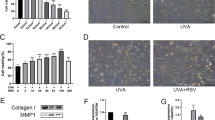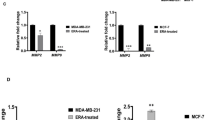Abstract
Resveratrol (trans-3,4′s,5,-trihydroxystilbene), a phytoalexin present in grape skin and red wine, suppresses many types of cancers by regulating cell proliferation and apoptosis through a variety of mechanisms. However, the effects of resveratrol on oral cancer are not completely understood. Thus, effects of resveratrol on cell growth and apoptosis induction were examined by 3-(4,5-dimethylthiazol-2-yl)-2,5-diphenyltetrazolium bromide assay, DNA fragmentation, immunoblotting, and determination of caspase activation in KB human oral cancer cells. Treatment with resveratrol induced inhibition of cell growth depending on the resveratrol treatment time and concentration in KB cells. Treatment with resveratrol induced DNA ladder formation in KB cells and promoted proteolytic cleavage of procaspase-3 and procaspase-7 with increases in the amount of cleaved caspases-3 and -7. Proteolytic processing of caspase-9 in KB cells was increased by resveratrol treatment. Activation of caspase-3/-7 was detected in living KB cells by fluorescence microscopy. These results suggest that the resveratrol can suppress cell growth and induce cell apoptosis in KB human oral cancer cells, and may have potential as an anti-cancer drug.
Similar content being viewed by others
References
Banerjee S, Bueso-Ramos C, and Aggarwal BB (2002) Suppression of 7,12- dimethylbenz(a)anthracene-induced mammary carcinogenesis in rats by resveratrol: Role of nuclear factor-kappaB, cyclooxygenase 2, and matrix metalloprotease 9. Cancer Res 62, 4945–4954.
Cheng YL, Lee SC, Lin SZ, Chang WL, Chen YL, Tsai NM, Liu YC, Tzao C, Yu DS, and Harn HJ (2005) Antiproliferative activity of Bupleurum scrozonerifolium in A549 human lung cancer cells in vitro and in vivo. Cancer Lett 222, 183–193.
Choi HS, Cho MC, Lee HG, and Yoon DY (2010) Indole-3-carbinol induces apoptosis through p53 and activation of caspase-8 pathway in lung cancer A549 cells. Food Chem Toxicol 48, 883–890.
Christou L, Hatzimichael E, Chaidos A, Tsiara S, and Bourantas KL (2001) Treatment of plasma cell leukemia with vincristine, liposomal doxorubicin and dexamethasone. Eur J Haematol 67, 51–53.
Cohen GM (1997) Caspases: The executioners of apoptosis. Biochem J 326, 1–16.
Datta R, Kojima H, Yoshida K, and Kufe D (1997) Caspase-3-mediated cleavage of protein kinase C theta in induction of apoptosis. J Biol Chem 272, 20317–20320.
Elliott PJ and Jirousek M (2008) Sirtuins: Novel targets for metabolic disease. Curr Opin Investig Drugs 9, 371–378.
Green DR and Reed JC (1998) Mitochondria and apoptosis. Science 281, 1309–1312.
Hengartner MO (2000) The biochemistry of apoptosis. Nature 407, 770–776.
Hope C, Planutis K, Planutiene M, Moyer MP, Johal KS, Woo J, Santoso C, Hanson JA, and Holcombe RF (2008) Low concentrations of resveratrol inhibit Wnt signal throughput in colon-derived cells: Implications for colon cancer prevention. Mol Nutr Food Res 52(Suppl 1), 52–61.
Hoshino T, Hara A, Inoue M, Honda J, Imai Y, Oizumi K, and Yokoyama MM (1997) Flow cytometric measurement of NK cell cytotoxicity. J Clin Lab Immunol 36, 39–43.
Hu W and Kavanagh JJ (2003) Anticancer therapy targeting the apoptotic pathway. Lancet Oncol 4, 721–729.
Hwang JH, Kim JY, Cha MR, and Park HR (2007) Effect of methanolic extract from silkworm droppings on proliferation and caspase activity in HT-29 human colon cancer cells. J Med Food 10, 467–472.
Jang M, Cai L, Udeani GO, Slowing KV, Thomas CF, Beecher CW, Fong HH, Farnsworth NR, Kinghorn AD, Mehta RG, Moon RC, and Pezzuto JM (1997) Cancer chemopreventive activity of resveratrol, a natural product derived from grapes. Science 275, 218–220.
Jiang H, Shang X, Wu H, Gautam SC, Al-Holou S, Li C, Kuo J, Zhang L, and Chopp M (2009) Resveratrol downregulates PI3K/Akt/mTOR signaling pathways in human U251 glioma cells. J Exp Ther Oncol 8, 25–33.
Karuppagounder SS, Pinto JT, Xu H, Chen HL, Beal MF, and Gibson GE (2009) Dietary supplementation with resveratrol reduces plaque pathology in a transgenic model of Alzheimer’s disease. Neurochem Int 54, 111–118.
Kaufmann SH and Earnshaw WC (2000) Induction of apoptosis by cancer chemotherapy. Exp Cell Res 256, 42–49.
Kaufmann SH and Hengartner MO (2001) Programmed cell death: Alive and well in the new millennium. Trends Cell Biol 11, 526–534.
Kim CS, Cho SH, Chun HS, Lee SY, Endou H, Kanai Y, and Kim DK (2008) BCH, an inhibitor of system L amino acid transporters, induces apoptosis in cancer cells. Biol Pharm Bull 31, 1096–1100.
Kim H, Moon JY, Mosaddik A, and Cho SK (2010) Induction of apoptosis in human cervical carcinoma HeLa cells by polymethoxylated flavone-rich Citrus grandis Osbeck (Dangyuja) leaf extract. Food Chem Toxicol 48, 2435–2442.
Kwon JI, Kim GY, Park KY, Ryu CH, and Choi YH (2008) Induction of apoptosis by linoleic acid is associated with the modulation of Bcl-2 family and Fas/FasL system and activation of caspases in AGS human gastric adenocarcinoma cells. J Med Food 11, 1–8.
Liu X, Zou H, Slaughter C, and Wang X (1997) DFF, a heterodimeric protein that functions downstream of caspase-3 to trigger DNA fragmentation during apoptosis. Cell 89, 175–184.
Mukherjee AK, Basu S, Sarkar N, and Ghosh AC (2001) Advances in cancer therapy with plant based natural products. Curr Med Chem 8, 1467–1486.
Notani PN (2000) Epidemiology and prevention of head and neck cancer: A Global View. In Contemporary Issues in Oral Cancer, Saranath D (ed.), pp. 1–29, Oxford University Press, Oxford, United Kingdom.
Park DI, Lee JH, Moon SK, Kim CH, Lee YT, Cheong J, Choi BT, and Choi YH (2005) Induction of apoptosis and inhibition of telomerase activity by aqueous extract from Platycodon grandiforum in human lung carcinama cells. Pharmacol Res 51, 437–443.
Paschka AG, Butler R, and Young CYF (1998) Induction of apoptosis in prostate cancer cell lines by the green tea component, (−)-epigallocatechin-3-gallate. Cancer Lett 130, 1–7.
Pezutto JM (1997) Plant-derived anticancer agents. Biochem Pharmacol 53, 121–133.
Reed JC (2001) Apoptosis-regulating proteins as targets for drug discovery. Trends Mol Med 7, 314–319.
Smets LA (1994) Programmed cell death (apoptosis) and response to anti-cancer drugs. Anti-Cancer Drug 5, 3–9.
Stewart JR, Artime MC, and O’Brian CA (2003) Resveratrol: A candidate nutritional substance for prostate cancer prevention. J Nutr 133, 2440–2443.
Tan ML, Suaiman SF, Najimuddin N, Smian MR, and Tengku Muhammad TS (2005) Methanolic extract of Pereskia bleo (Kunth) DC. (Cactaceae) induces apoptosis in breast carcinoma, T47-D cell line. J Ethnopharmacol 96, 287–294.
Tian Z, Chen S, Zhang Y, Huang M, Shi L, Huang F, Fong C, Yang M, and Xiao P (2006) The cytotoxicity of naturally occurring styryl lactones. Phytomedicine 13, 181–186.
Todd R, Donoff RB, and Wong DT (1997) The molecular biology of oral carcinogenesis: Toward a tumor progression model. J Oral Maxillofac Surg 55, 613–623.
Vanamala J, Reddivari L, Radhakrishnan S, and Tarver C (2010) Resveratrol suppresses IGF-1 induced human colon cancer cell proliferation and elevates apoptosis via suppression of IGF-1R/Wnt and activation of p53 signaling pathways. BMC Cancer 10, 238–251.
van Poppel G and van den Berg H (1997) Vitamins and cancer. Cancer Lett 114, 195–202.
Wang TT, Hudson TS, Wang TC, Remsberg CM, Davies NM, Takahashi Y, Kim YS, Seifried H, Vinyard BT, Perkins SN, and Hursting SD (2010) Differential effects of resveratrol on androgen-responsive LNCaP human prostate cancer cells in vitro and in vivo. Carcinogenesis 29, 2001–2010.
Author information
Authors and Affiliations
Corresponding author
Additional information
S. H. Kim and H. J. Kim contributed equally.
Rights and permissions
About this article
Cite this article
Kim, SH., Kim, HJ., Lee, MH. et al. Resveratrol induces apoptosis of KB human oral cancer cells. J Korean Soc Appl Biol Chem 54, 966–971 (2011). https://doi.org/10.1007/BF03253187
Received:
Accepted:
Issue Date:
DOI: https://doi.org/10.1007/BF03253187




